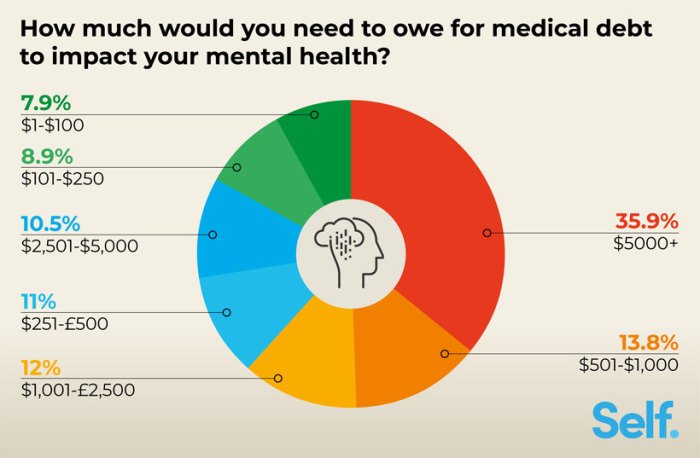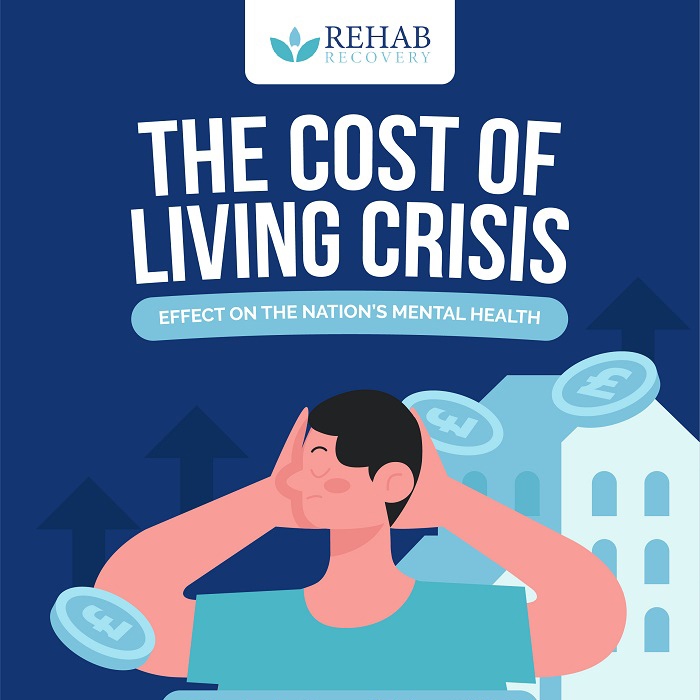
Impact of Healthcare Costs on Mental Health sets the stage for this enthralling narrative, offering readers a glimpse into a story that is rich in detail with casual formal language style and brimming with originality from the outset.
The intersection of healthcare costs and mental health is a complex yet crucial aspect of overall well-being. As individuals navigate the intricate web of expenses related to healthcare, the repercussions on mental health can be profound and far-reaching. This discussion delves into the various dimensions of this relationship, shedding light on the challenges, strategies, and interventions that play a pivotal role in shaping mental health outcomes in the face of escalating healthcare costs.
Healthcare Access

Easy access to healthcare services is crucial for maintaining good mental health. When individuals can readily seek medical attention and support, they are more likely to address any mental health concerns promptly, preventing them from escalating into more serious issues.
Impact of Limited Access to Healthcare Facilities on Mental Health Outcomes
Limited access to healthcare facilities can have detrimental effects on mental health outcomes. Individuals may delay seeking treatment due to long wait times or lack of nearby facilities, leading to worsening symptoms and decreased quality of life. This can result in increased stress, anxiety, and depression.
Initiatives Improving Healthcare Access for Better Mental Health Support
- Telehealth Services: Virtual consultations and therapy sessions make it easier for individuals to access mental health support from the comfort of their homes, overcoming barriers such as transportation and distance.
- Community Health Centers: Establishing more community health centers in underserved areas ensures that individuals have local access to healthcare services, including mental health screenings and treatment.
- Mobile Clinics: Bringing healthcare services directly to communities through mobile clinics helps reach individuals who may have limited transportation options or live in remote areas.
- Integrated Care Models: Integrating mental health services into primary care settings makes it easier for individuals to address both their physical and mental health needs in one location, reducing barriers to seeking help.
Healthcare Costs
High healthcare costs can have a significant impact on mental health, creating additional stress and anxiety for individuals already dealing with health issues. The financial burden of medical expenses can lead to feelings of helplessness, frustration, and even depression, as individuals may struggle to afford necessary treatments or medications.
Effects of Financial Burdens on Mental Well-being
- The constant worry about how to pay for healthcare expenses can increase feelings of anxiety and stress, affecting overall mental well-being.
- Individuals may be forced to make difficult decisions, such as choosing between paying for medical care or other essential needs, leading to feelings of guilt and inadequacy.
- The fear of accumulating debt or facing bankruptcy due to high medical bills can contribute to a sense of hopelessness and despair.
Strategies to Mitigate Negative Impact
- Seeking financial assistance programs or resources offered by healthcare providers or government agencies can help alleviate some of the financial burden.
- Creating a budget and exploring cost-effective healthcare options, such as generic medications or outpatient services, can help manage expenses.
- Openly communicating with healthcare providers about financial concerns and exploring alternative treatment plans or payment options can reduce stress and anxiety related to costs.
Healthcare Providers
Healthcare providers play a crucial role in addressing mental health issues related to healthcare costs. These professionals are on the front lines of patient care and are in a unique position to offer support and guidance to individuals struggling with the financial burden of healthcare expenses.
Supportive Interventions by Healthcare Providers
Healthcare professionals can support patients dealing with mental health concerns due to healthcare expenses in various ways:
- Offering resources and information on financial assistance programs available to help cover the costs of treatment.
- Providing emotional support and counseling to help patients cope with the stress and anxiety associated with financial strain.
- Collaborating with mental health professionals to develop treatment plans that consider both the medical and financial aspects of care.
Examples of Positive Interventions
Some examples of healthcare provider interventions that positively impact mental health in cost-related situations include:
- Working with insurance companies to advocate for coverage of mental health services and medications.
- Offering sliding scale fees or payment plans for patients who may be experiencing financial difficulties.
- Connecting patients with community resources and support groups that can provide additional assistance and guidance.
Health Insurance
Having adequate health insurance coverage is crucial for accessing mental health care services. Health insurance can significantly reduce the financial burden on individuals seeking treatment for mental health conditions, making it more affordable and accessible.Health insurance coverage plays a vital role in determining the mental health outcomes of individuals. Those with health insurance are more likely to seek timely and appropriate mental health care, leading to better management of their conditions and improved overall well-being.
On the other hand, individuals without health insurance may delay or forego necessary mental health treatment due to cost concerns, resulting in poorer outcomes and a higher risk of escalating mental health issues.
Types of Health Insurance Plans for Mental Health Needs
- Employer-Sponsored Health Insurance: Many employers offer health insurance plans that include coverage for mental health services. Employees can access therapy, counseling, and psychiatric care through these plans.
- Medicaid: Medicaid provides health insurance coverage to low-income individuals and families, including mental health services. It offers a range of mental health treatments, such as therapy and medication, at low or no cost.
- Medicare: Medicare covers mental health services for individuals aged 65 and older, as well as those with certain disabilities. It includes outpatient counseling, inpatient care, and prescription medication for mental health conditions.
- Private Health Insurance: Private health insurance plans vary in coverage for mental health services. Some plans offer comprehensive mental health benefits, including therapy, counseling, and psychiatric care, while others may have limited coverage or higher out-of-pocket costs.
Health Policies

Healthcare policies play a crucial role in shaping mental health outcomes, as they directly impact access to services and treatment options. In the context of high healthcare costs, policy changes are essential to address the mental health implications and ensure individuals receive the care they need without financial burden.
Influence of Healthcare Policies on Mental Health Outcomes
Healthcare policies can influence mental health outcomes by determining the availability of mental health services, coverage for treatments, and overall support for individuals experiencing mental health challenges. Policies that prioritize mental health resources and funding can lead to better outcomes for individuals seeking care.
Addressing Mental Health Impact of High Healthcare Costs through Policy Changes
Policy changes can address the mental health impact of high healthcare costs by implementing measures such as expanding mental health coverage, reducing out-of-pocket expenses for mental health services, and increasing funding for mental health programs. By making mental health care more affordable and accessible, individuals are more likely to seek help and receive the necessary support.
Examples of Successful Policy Implementations
- Medicaid Expansion: States that expanded Medicaid eligibility under the Affordable Care Act saw increased access to mental health services for low-income individuals, leading to improved mental health outcomes.
- Mental Health Parity Laws: Laws that require insurance plans to cover mental health services at the same level as physical health services have helped reduce disparities in access to mental health care and address the stigma associated with seeking treatment.
- Telehealth Policies: During the COVID-19 pandemic, policy changes to expand telehealth services allowed individuals to access mental health care remotely, increasing accessibility and reducing barriers to treatment.
Health Records
Maintaining accurate health records plays a crucial role in managing mental health conditions affected by healthcare costs. These records provide valuable insights into a patient’s medical history, treatment plans, and progress, helping healthcare providers make informed decisions.
Tailoring Cost-Effective Treatment Plans
Health records allow healthcare providers to tailor cost-effective treatment plans for mental health issues by analyzing past treatments, medication effectiveness, and therapy outcomes. By understanding a patient’s history and response to different interventions, providers can customize treatment plans that are both clinically effective and financially sustainable.
Benefits of Electronic Health Records
Electronic health records offer numerous benefits in tracking mental health progress amidst varying healthcare costs. These digital records streamline information sharing among healthcare providers, reduce medical errors, and improve coordination of care. Additionally, electronic records enable real-time monitoring of a patient’s mental health status, facilitating timely adjustments to treatment plans based on cost considerations and effectiveness.
Health Screening
Regular health screenings play a crucial role in preventing mental health crises that may arise due to healthcare costs. By detecting health issues early on, individuals can receive timely treatment and support, reducing the risk of mental health challenges associated with financial burdens.
Importance of Regular Health Screenings
- Screenings for conditions such as hypertension, diabetes, and cancer can help identify potential health concerns before they escalate, leading to better management of both physical and mental well-being.
- Early detection through screenings allows for proactive intervention, reducing the likelihood of developing severe health issues that may result in increased healthcare costs and mental health stress.
- Health screenings can also guide individuals in making lifestyle changes and accessing necessary resources to improve their overall health, thereby mitigating the impact of healthcare expenses on mental wellness.
Examples of Effective Health Screening Programs
- The National Breast and Cervical Cancer Early Detection Program (NBCCEDP) provides low-income, uninsured, and underserved women with access to timely screenings for breast and cervical cancer, offering early detection and treatment options that can alleviate mental health concerns related to healthcare costs.
- The National Colorectal Cancer Roundtable (NCCRT) promotes colorectal cancer screening initiatives to increase early detection rates and reduce the financial burden of advanced cancer treatment, contributing to improved mental health outcomes for individuals facing healthcare cost challenges.
- Community-based health clinics and mobile screening units offer convenient and affordable screening services to underserved populations, enabling individuals to prioritize their health and well-being despite financial constraints, ultimately supporting positive mental health outcomes.
As we conclude this exploration of the impact of healthcare costs on mental health, it becomes evident that the financial aspect of healthcare is intricately linked to mental well-being. By understanding the nuances of this connection and implementing effective measures to address it, we can strive towards a healthier and more resilient society where individuals are supported in both body and mind.
FAQ Resource
How do high healthcare costs impact mental health?
High healthcare costs can lead to increased stress, anxiety, and even depression as individuals struggle to afford necessary medical care, impacting their mental well-being.
What are some strategies to mitigate the negative impact of high healthcare costs on mental health?
Some strategies include financial planning, seeking out community resources for support, and exploring options for reduced-cost or free healthcare services.
How can healthcare providers support patients dealing with mental health concerns due to healthcare expenses?
Healthcare providers can offer counseling, connect patients with mental health resources, and work with patients to find affordable treatment options.





